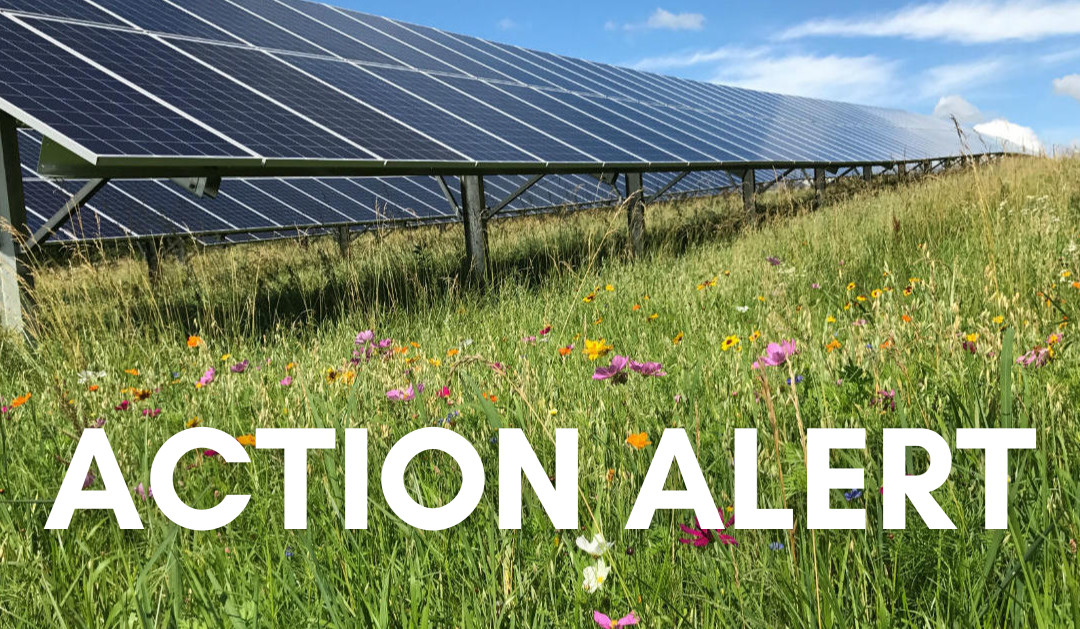
by Alex Beld | May 23, 2024 | Action Alert, Advocacy, Public Service Commission
A draft Environmental Impact Statement (EIS) created by the Department of Natural Resources (DNR) is before the Public Service Commission of Wisconsin regarding Vista Sands Solar Farm and is missing a discussion of solar’s impact on reducing carbon emissions. In its current form, the EIS is also missing a full description of the effects of climate change on the Greater Prairie Chicken. Knowing these environmental impacts could help the PSCW during their decision-making process.
Join us in asking that the EIS be revised to include necessary information as it relates to the Greater Prairie Chicken and the impacts the Vista Sands Solar Farm would have on this protected bird and its habitat. Comments for the PSCW related to the EIS are due by the end of the day on June 14.
Sample comments are provided below. Personalized comments are more effective, please take the time to make your message to the PSCW unique.
Sample Comments:
The Environmental Impact Statement (EIS) made for the Vista Sands Solar Farm by the Department of Natural Resources should be revised to reflect all aspects of the proposed solar farm. The current version of the EIS is missing key considerations related to how Vista Sands would reduce carbon emissions. Vista Sands would, in combination with other clean energy resources, mitigate climate change, which is a key driver in habitat loss for the Greater Prairie Chicken.
The EIS is also missing important details, such as a complete description of over a century of land changes, and other the main reasons for the Greater Prairie Chicken’s habitat loss in the region. I am urging the DNR to update their EIS to create a more complete picture of the Greater Prairie Chicken, its habitat, and the benefits of reduced carbon emissions.
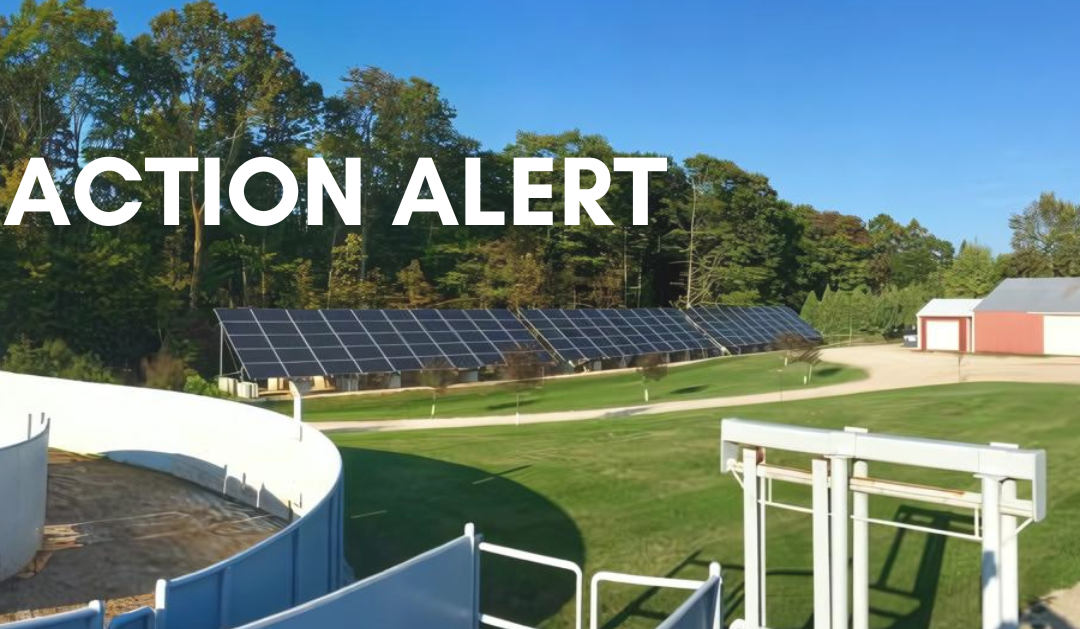
by Alex Beld | May 2, 2024 | Action Alert, Advocacy, Net Metering, Public Service Commission
Sturgeon Bay Utilities (SBU) has filed an application with the Public Service Commission of Wisconsin to revise its parallel generation tariffs, significantly altering the way SBU compensates electric generation from its customers who go solar. SBU’s wholesale provider, WPPI Energy, has stated that it intends to replicate these proposed changes with all of its municipal electric utilities in Wisconsin. Check here to see if your utility could be affected.
If accepted, SBU’s proposal would modify its net metering tariff so that excess generation at the end of each billing month would be subject to wholesale rates instead of retail rates. For larger solar installations (above 20 kilowatts), SBU proposes that all excess generation is subject to volatile wholesale prices, which are typically low and subject to annual changes.
RENEW Wisconsin is the only intervening party in the case and has submitted testimony arguing to preserve net metering and pay larger solar installations (at schools, hospitals, and businesses) at rates that reflect SBU’s avoided costs, which is defined as the amount the utility saves when their customers generate solar power. See RENEW’s direct testimony for details.
The PSC has opened up the public comment period in this case (docket 5780-TE-111). You have until the end of the day on May 9 to submit your comments to the PSC. Tell the PSC to ensure that there is an economic pathway for customers to go solar. We need to preserve net metering for all customers in Sturgeon Bay and the rest of Wisconsin and pay fair rates for larger customer-sited renewable facilities.

by Beata Wierzba | Apr 25, 2024 | Advocacy, Legislative Watchlist, Local Government
With Wisconsin’s 2023-2024 legislative session concluded, RENEW Wisconsin is now focused on educating candidates and voters, preparing for the August and November elections, and planning for the next legislative session. We are paying close attention to a referendum question on the August ballot that will decide how federal funds that come to the state will be allocated.
Amendments to the Wisconsin Constitution occur infrequently. The process of seeking a constitutional amendment involves identical question language, passing two legislative sessions consecutively, and then being approved by the voters through a statewide referendum or through court action. To undo an amendment also involves two consecutive legislative votes and a referendum by the voters or court action.
The referendum questions before the voters to be presented at the August partisan primary ballot are based on Assembly Joint Resolution 6, a proposal that was passed by Wisconsin’s legislature in March of this year. The exact wording is:
“Delegation of appropriation power. Shall section 35 (1) of article IV of the constitution be created to provide that the legislature may not delegate its sole power to determine how moneys shall be appropriated?”
And
“Allocation of federal moneys. Shall section 35 (2) of article IV of the constitution be created to prohibit the governor from allocating any federal moneys the governor accepts on behalf of the state without the approval of the legislature by joint resolution or as provided by legislative rule?”
In plain terms, the changes would limit the Governor’s authority and instead require that the state legislature decide how and when to disperse federal funds.
Under current law, the Governor of the state has the authority to accept federal funding on behalf of the state and allocate the funds without specific approval or involvement from the state legislature. States have benefited from federal assistance during extensive emergencies, extreme weather conditions, natural disasters, and other situations where immediate financial assistance was critical. In more recent years, the Inflation Reduction Act and the Bipartisan Infrastructure Law allocated money to the states to implement Wisconsin’s transition to clean energy.
It will be up to Wisconsin voters to decide whether this proposal becomes law. Approving this Amendment and tasking the state legislature with allocating federal funding would require consensus among 132 legislators in order to connect Wisconsin residents and communities to federal money. If the amendment does not pass, the Governor, as the head of state, can continue to accept and disperse federal money.
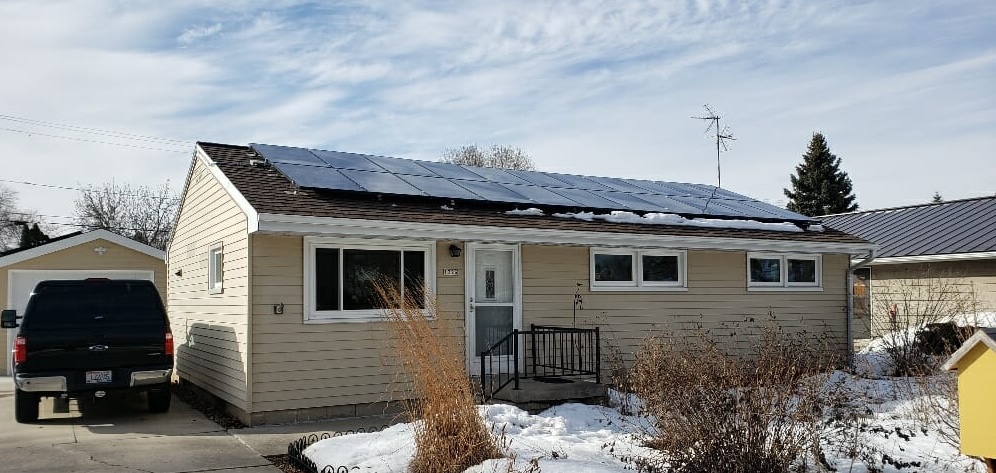
by RENEW Wisconsin | Apr 23, 2024 | Advocacy, Electrification, Press Release, Solar
The Environmental Protection Agency (EPA) has announced the recipients of the Solar for All grants, with $124 million in funding awarded to the Wisconsin Economic Development Corporation (WEDC) and Midwest Tribal Energy Resources Association (MTERA). This influx of resources will help to accelerate our state’s clean energy transition.
Solar for All will increase access to renewable energy for around 15,000 Wisconsin homes, including single-family, multi-family, or community solar projects. The grant awarded to WEDC will bring $62,450,000 to the state of Wisconsin, this historic investment will increase solar access for Wisconsinites across both rural and urban communities.
This down payment on our state’s clean economy signals a new day for renewable energy solutions for all Wisconsinites. RENEW applauds this critical step toward increased solar access and how it ensures every community can participate and benefit from clean energy. Communities across the state will experience reduced reliance on fossil fuels and expanded clean energy job creation as we build a healthier, more equitable clean energy future.
More on Solar for All:
• The Solar for All competition, which was created by the Inflation Reduction Act’s Greenhouse Gas Reduction Fund (GGRF), will expand the number of low-income and disadvantaged homes primed for residential solar investment.
• Wisconsin is one of 60 states, territories, Tribal governments, municipalities, and eligible nonprofits awarded grants to create and expand low-income solar programs that provide financing and technical assistance, such as workforce development, to enable low-income and disadvantaged households and communities to deploy and benefit from residential solar.
• The Solar for All competition will provide more than $7 billion nationwide to increase access to affordable, resilient, and clean solar energy for millions of low-income households.
RENEW congratulates Governor Tony Evers, WEDC, and MTERA on their work to ensure our state continues to bring renewable energy commitments to our state. This funding will help advance environmental justice efforts by enabling low-income households to access clean, resilient solar power, lowering energy costs, and creating good jobs in underserved areas.
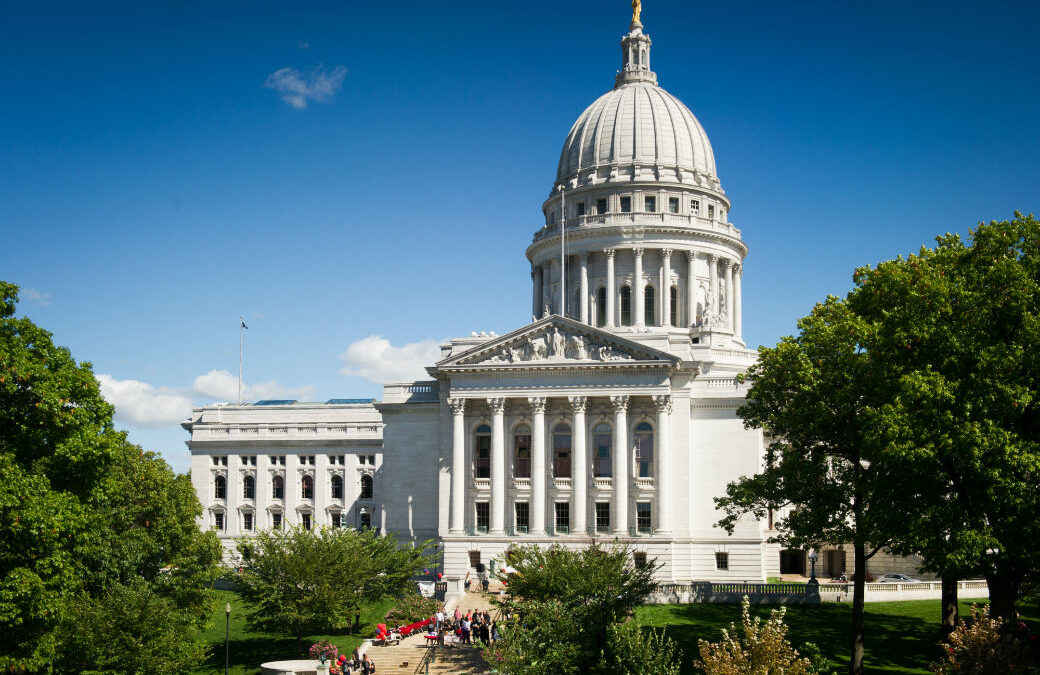
by Beata Wierzba | Mar 14, 2024 | Advocacy, Electric Vehicles, Legislative Watchlist, Local Government, NEVI, Solar
As the legislature wraps up for this session, RENEW is celebrating several victories and reflecting on some of the other renewable energy measures being considered by the state legislature.
Big Win for Electric Vehicle Infrastructure
Senate Bill 791, the Electric Vehicle Charging Bill, passed the legislature with several amendments. The legislation exempts private entities that develop charging stations from being regulated as a public utility but allows them to measure the cost of electricity used for charging EVs by the kilowatt hour (kWh). Establishing this new kWh standard to calculate how much electricity is used, rather than how long it takes to charge the vehicle, provides an essential uniform requirement for the industry. It is also required by the National Electric Vehicle Infrastructure (NEVI) Program for Wisconsin to qualify for $78 million dollars in federal funding, an 80% cost share, for level 3 chargers to build corridors for charging. RENEW will be developing a detailed overview of the passed legislation for those interested in more information. The bill received bipartisan support and limited opposition. In other actions related to electric vehicles, the Legislature also passed SB 792, which establishes the infrastructure program and enables the state to utilize the federal NEVI funding. Additionally, with the passage of SB 617, the DOT will issue registration plates or stickers for existing license plates that indicate the vehicle is electric.
Progress on Community Solar
The community solar bill, Assembly Bill 258, did not pass either the Senate or Assembly but did get a hearing in the Assembly Committee on Energy & Utilities. This is a significant development considering the heavy opposition from Wisconsin Utilities. The public hearing was a great opportunity for the benefits of community solar to be shared with state legislators. During the hearing, supporters of community solar were able to answer questions, correct misinformation, and show their unity and strength. Establishing a community solar program for renewable energy generation is essential for those without the option to install panels on their own roofs, or the financing necessary to cover costs. Under the community solar arrangement, the participants subscribe to the developed project and receive a credit on their electric bill for solar electricity generated on panels installed in a community setting. The developer arranges permitting, financing, and installation, as well as maintenance. If passed, the legislation would require approval of the location by local governments and be limited to 5 megawatts or about 26 acres. Each project would also require at least four subscribers. With fierce opposition in some areas to larger utility-scale operations, the community solar model is a better fit.
Other Legislative Wins
There were numerous bills that aimed to limit renewable energy development, including restrictive sitting and increased regulation. They did not pass, and in most cases, did not receive a hearing. These bills ultimately died in committee.
Assembly Joint Resolution 6
Assembly Joint Resolution 6 (AJR6) would give the Wisconsin Legislature control over how federal funds are spent, rather than the Governor, on behalf of the state. Recent examples of federal funds distributed to the states include the Inflation Reduction Act (IRA) and the Bipartisan Infrastructure Law (BIL), both have benefited Wisconsin’s clean economy. The Wisconsin constitution directs the Governor, as head of state, to oversee disbursement. In order to change the constitution, identical legislation has to pass the legislature twice in a row and then be considered by state voters. Because it is not regular legislation but a joint resolution of the legislature, the Governor does not have veto power. After the passage, the resolution language will become the referendum during an upcoming election, with the resolution language being the exact question asked. If voters approve the referendum, the state will need to modify the constitution. The consequences of this change can impact many efforts, such as conservation measures, disaster relief funds, higher education, and more. The earliest statewide election when this referendum can be placed on the ballot is the August primary. Efforts are on the way to provide information and educate the voters on the impact the change could have on issues of importance to them.
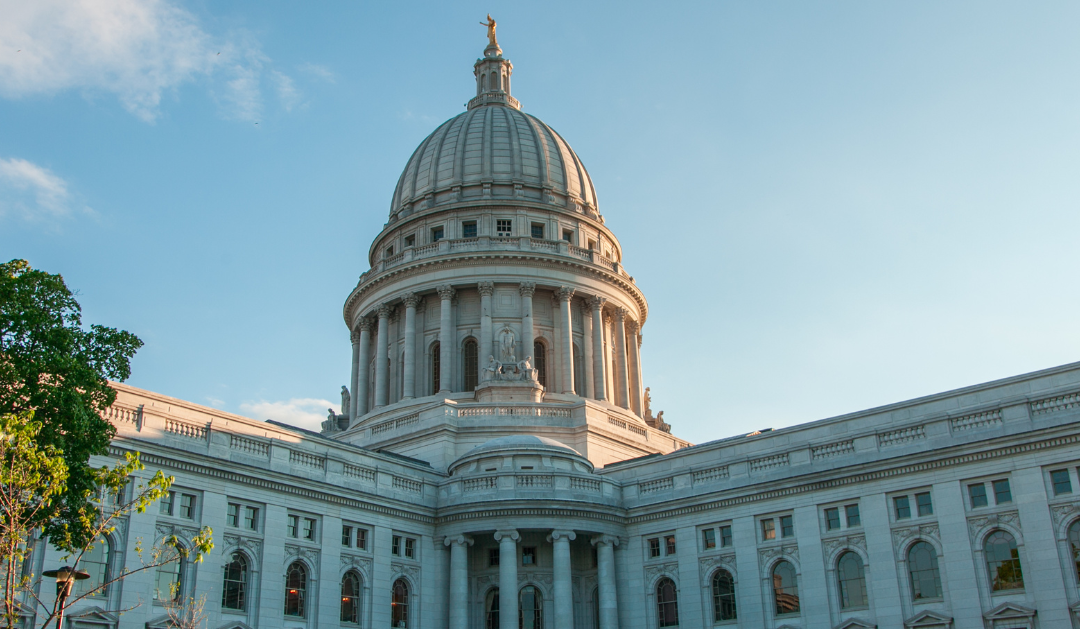
by Beata Wierzba | Jan 23, 2024 | Advocacy, Electric Vehicles, Local Government, Public Service Commission
Wisconsin’s state legislature has acted swiftly this January to move legislation impacting electric vehicles (EV) through the legislative process. The Senate version of the proposed EV bill, SB 791, has already passed through the Senate Utilities & Technology Committee with a recommendation for passage. Similarly, the Assembly version of the bill, AB 846, cleared the State Assembly Committee on Energy & Utilities.
The legislation also passed through the Joint Committee on Finance and Joint Survey Committee on Tax Exemptions, gathering favorable votes. Most recently, the full Senate passed their version of the bill in a 30-2 vote. The next step is a vote by the full Assembly after which the bill will go to the Governor’s desk.
As with all legislative bills, amendments and tweaks along the way are common. There have been three amendments added so far, and we are analyzing the impact of these on the original bill.
The focus of the bill is to allow non-utilities to seek payment from EV drivers based on the amount of electricity they use to charge their vehicles rather than the time it takes for the vehicle to charge. This qualifies Wisconsin public and private entities to receive federal dollars to help build charging infrastructure while also establishing operational and maintenance requirements for the chargers.
National Electric Vehicle Infrastructure (NEVI) funding would be available for up to 5 years, which is especially beneficial for areas where the market is not yet ready to support EV infrastructure but could in a few years. This allows the areas that currently have less EV traffic to build EV charging infrastructure to support a growing user base.
RENEW initially raised concerns about the impact the bills would have on existing EV charging facilities and the need for the state to have similar opportunities for infrastructure that local governments would. Those concerns have been addressed in part within the proposed amendments.
SB 791 and AB 846 bring Wisconsin in line with 48 other states while providing uniform access, pricing, accountability, and standards for EV Charging. We expect to see the bill become law.






